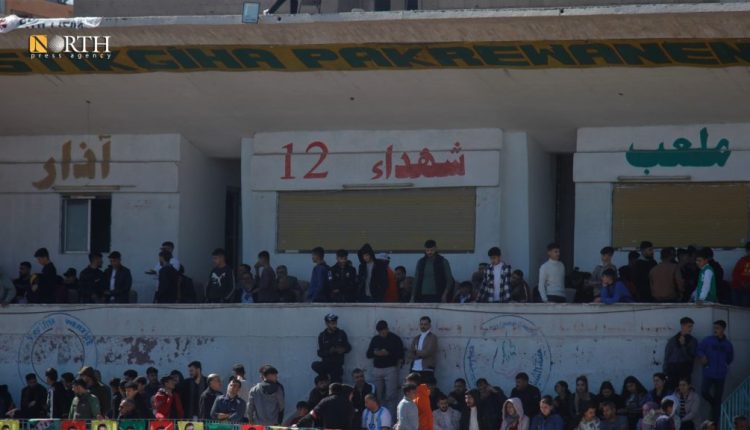
By Abdulsalam Khoja
QAMISHLI, Syria (North Press) – Every year on March 12, Kurds in northeastern Syria commemorate the March 12 Uprising, a pivotal moment in their struggle against the al-Assad regime. What began as a football match dispute in the city of Qamishli in 2004 and quickly spread within hours to other Kurdish cities, as well as Aleppo and Damascus.
The events resulted in the death of over 30 people and dozens of injuries, while Syrian authorities arrested more than 2,000 individuals, according to Kurdish human rights organizations.
The incident began with a clash between supporters of two football teams during a match in Qamishli, between al-Fotuwa and al-Jihad. Tensions escalated when al-Fotuwa fans threw stones at al-Jihad supporters. However, the situation worsened when Syrian security forces intervened, using live ammunition against al-Jihad fans.
Rising tensions
Before reaching the stadium, al-Fotuwa supporters paraded through the streets of Qamishli, chanting provocative slogans and hurling insults at Kurdish leaders.
Despite the presence of Syrian security forces at the stadium gates, al-Fotuwa fans managed to enter without undergoing security checks. According to eyewitnesses and video footage, they carried clubs, knives, and stones.
Just before the match started, tensions escalated further as al-Fotuwa fans intensified their slogans, began throwing stones and attacking al-Jihad supporters. The security forces then intervened by opening fire on the al-Jihad crowd, killing four civilians.
Outrage grows
Shortly after, Syrian state radio announced in its sports program “Our Green Stadiums” that the match had been stopped due to clashes between the fans. It reported that three children had been trampled to death in the chaos.
Thousands of Qamishli residents rushed to the stadium to check on their loved ones, but security forces blocked their entry. Inside, the sounds of screaming, fighting, and gunfire could be heard.
Tensions escalated further when the then Governor of Hasakah, Salim Kabboul, arrived at the scene. According to eyewitnesses and human rights monitors, Kabboul ordered security forces to open fire on the crowd, leading to more casualties.
Protests spread
On March 13, as thousands gathered for the funerals of those killed, the scene turned into a mass protest. Syrian security forces initially fired warning shots into the air, but later directly targeted mourners, killing and injuring more people.
What began as funeral processions quickly escalated into widespread protests across Kurdish-majority cities, including Amuda, Derbasiyah, Tirbe Spiyeh (al-Qahtaniya), Girke Lege (Maabadeh), Derik (al-Malikiyah), Sere Kaniye (Ras al-Ain), Kobani, and Afrin, as well as Aleppo University, the Sheikh Maqsoud and Ashrafiyeh neighborhoods, and even the capital, Damascus.
On March 14, a massive demonstration erupted in Kobani. Syrian security forces responded by opening fire on protesters, injuring several. The unrest continued until March 31, when authorities launched a wave of mass arrests in the city.
On March 16, thousands of Afrin residents staged a solidarity march with Qamishli and other protesting cities, coinciding with a large demonstration in Aleppo’s Kurdish-majority Ashrafiyeh neighborhood.
The protests lasted for a week before Syrian security forces launched a sweeping crackdown. Hundreds of Kurds were arrested, and 60 Kurdish students were expelled from Syrian universities, 11 of whom were permanently banned from higher education.
Lasting memory
Every year, on March 12, a friendly football match is held in the same stadium where the events began, symbolizing reconciliation and brotherhood between the communities.
The stadium was later renamed “12 March Stadium” to honor the victims of the uprising, which Kurds regard as a revolution against al-Assad’s oppressive security forces.
This year’s commemoration comes amid major political and military shifts in Syria, most notably the fall of the al-Assad regime. Kurds are now looking forward to securing their political and constitutional rights for the first time in the country’s history.
